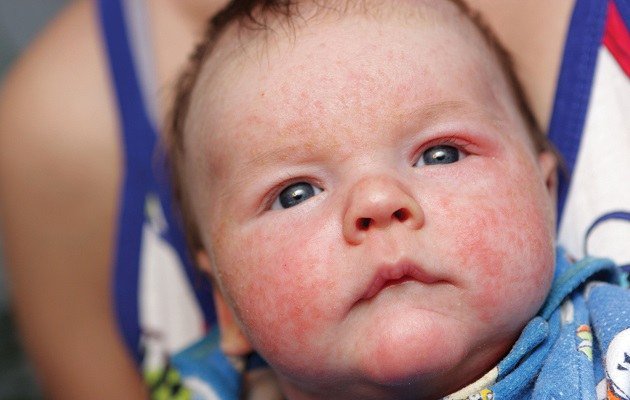Causes
To understand why this particular product becomes an irritant, you need to consider its production technology. To make kefir you need milk and kefir grains. The milk is pasteurized to destroy pathogenic flora, cooled and mixed with a starter culture mixed with kefir grains. It usually includes lactic acid bacilli and lactic acid streptococci, including lactic yeast. Random microflora such as acetic acid bacteria, spore sticks, milk molds, filmy yeasts, and Coli bacteria are also acceptable.
Once in milk, microflora multiplies. At the same time, acidity increases, casein coagulation occurs and a clot forms. To ensure a uniform process, the product is mixed.
But not all cow's milk protein is processed. A small amount remains and can cause allergies. The process of kefir ripening occurs with the participation of another allergen - kefir yeast. Thus, the finished product has allergenic potential.
A reaction occurs in the presence of one or more provoking factors, including:
- hereditary predisposition;
- individual hypersensitivity;
- consumption of low-quality or expired product.
Prevention
Prevention of allergies to fermented milk products should be carried out at the stage of gestation .
A woman should control her diet and avoid excessive consumption of foods of various categories (in this case, fermented milk). A similar rule must be followed during lactation.
Complementary feeding should be introduced to the child in a timely manner and in accordance with generally accepted recommendations.
Additional preventive measures:
- If, after consuming fermented milk products, a child has a negative reaction from the body, then the baby must be examined to identify allergies.
- When choosing fermented milk products for a children's menu, you must carefully study the composition (dyes, flavors and other components can trigger allergies).
- Kefir can be given to children from two years of age (the use of this product by young children may increase the risk of developing an allergic reaction).
Allergies to fermented milk products can be inherited. If one of the parents has such a pathology, then the child must be examined by an allergist. Early identification of a problem can make it easier to prevent.
Dr. Komarovsky about fermented milk nutrition in this video:
We kindly ask you not to self-medicate. Make an appointment with a doctor!
Ancient doctors knew about the beneficial effects of fermented milk products, including kefir, on human health. The unique composition of the drink is due to the high content of calcium, phosphorus, zinc, vitamins A, B, C, E, and probiotics. It is low in calories, but at the same time nutritious and easily digestible. Kefir, having a positive effect on the functioning of the gastrointestinal tract, stimulates digestion, helps cleanse the body and normalizes weight. It also improves the condition of the skin, teeth, hair and nails, improves immunity, prevents the development of osteoporosis and even slows down the development of cancer cells. But not everyone benefits from kefir; some people develop intolerance.
Symptoms
Symptoms of an allergy to kefir develop within 6 hours after consuming the product and are expressed:
- on the skin side - a small allergic rash, the elements of which gradually merge into large spots, eczema, swelling of the eyes, cheeks, lips (in children, extensive swelling of the entire body is possible);
- from the gastrointestinal tract - vomiting, abdominal pain, flatulence, diarrhea, constipation;
- from the respiratory system - shortness of breath, difficulty breathing, allergic rhinitis, cough.
Sometimes the reaction occurs instantly: the temperature rises and vomiting appears. This is more common in young children.
In severe cases, anaphylactic shock may develop. This is a life-threatening condition in which blood pressure decreases, respiratory function is impaired, and a person loses consciousness.
If you or your child has a reaction to kefir, you should be aware of the possibility of cross-allergy to mold, antibacterial drugs of the penicillin group, mold cheese, kvass, beer, wine, yeast dough and mushrooms. If the immune response is associated with a primary allergy to cow's milk protein, then a negative reaction may occur when consuming other fermented milk products, beef, veal, preparations based on cattle tissue, and goat milk. A reaction to cow hair is also possible.
Allergy to fermented baked milk
Having written several articles about the benefits of fermented baked milk and its scope of application, we were puzzled by the question of whether fermented baked milk can be consumed if you have allergies. As a result of studying the issue, it was decided to write an independent and useful article about this.
Ryazhenka is a fermented milk product known since ancient times. Several centuries before today, she was a frequent guest at the rural table. Fermented baked milk was prepared by fermenting baked milk: first, cream was added to the milk for fat content and placed in the oven for several hours to simmer at high temperature, then sour cream was added to the already baked milk as a starter and left to ferment for some time in a warm place. The result was a delicate, cream-colored milk product.
Today, to try fermented baked milk, you just need to go to a grocery store or buy a special sourdough starter at a pharmacy.
Ryazhenka is useful for both an adult and a growing child’s body, since, like most fermented milk products, it is rich in calcium, phosphorus, vitamins A, E, C, group B, and easily digestible amino acids.
One glass of fermented baked milk can provide the body with 1/4 of the daily requirement of calcium and 1/5 of the daily requirement of phosphorus.
Also, thanks to its composition, fermented baked milk promotes the harmonious functioning of the digestive system and gives a pleasant feeling of fullness. Also, consuming fermented baked milk benefits joints and heart function. Moreover, fermented baked milk can also be used for cosmetic purposes, for example, as a hair mask or as a face wash.
Ryazhenka is a suitable product to include in the diet; it is also recommended for use for certain types of allergies.
Allergy is the increased sensitivity of the human immune system to various types of allergens.
Allergies occur as follows:
The body's immune system produces special antibodies, the task of which is to neutralize foreign substances - antigens - that have entered the body. However, sometimes the immune system fails and produces antibodies to destroy substances that are harmless in nature. Such a failure provokes the launch of an allergic reaction to antigens, which in this situation act as allergens.
Since human immunity is endowed with memory, having reacted hypersensitively to any antigen, it will remember it and classify it as an allergen forever. Therefore, allergies are incurable.
The manifestation of allergies has many faces, it can be swelling, runny nose, tearing, redness of the skin and mucous surfaces, etc. Such manifestations are not always harmless; in some cases, medical intervention may be required.
Diagnosing whether a person is allergic to any substance is now quite simple; to do this, you need to go to a medical institution and undergo the appropriate tests.
Once it is determined what substance your body perceives as an allergen, you should avoid contact with it. And when this is not possible (as, for example, in the case of poplar fluff), you will have to take medications.
Allergy to dairy products
It happens that dairy products can cause an allergic reaction.
The fact is that milk contains proteins, which in some cases are perceived by our immune system as allergens.
Milk contains several proteins.
One of them is casein. It is found in milk and all its derivative products, including cottage cheese and cheese. If this protein is the allergen, then the question of whether you can drink fermented baked milk if you have an allergy no longer stands. You should avoid consuming all fermented milk products.
In addition to casein, milk contains whey proteins, which can also cause allergies. However, given that this category of proteins is destroyed during heat treatment, fermented milk products obtained by heating, simmering or boiling will not cause an allergic reaction. Therefore, with this type of allergy, fermented baked milk can be consumed.
Ryazhenka for allergies
Recent research shows that some fermented milk products are a good preventative for allergic reactions.
So, fermented baked milk directly contains substances that can lower the level of immunoglobulin, an excess of which causes an allergic process, so it can be consumed daily in small quantities, one glass is enough.
We consider it necessary to note that when choosing fermented baked milk, it is better to give preference to a product with a short shelf life, so that it does not contain preservatives that can provoke an allergic reaction. To make the issue of making fermented baked milk transparent to you, we recommend reading the article on the production of fermented baked milk using the tank method.
As you can see, the question of whether you can drink fermented baked milk if you have an allergy should be answered in the affirmative, with some exceptions. This exception is an allergic reaction to casein.
Dairy products must be included in the diet of a nursing mother. A large amount of vitamins and useful elements will help the mother recover faster after childbirth and ensure the full growth and development of the baby. During breastfeeding, you need to consume 0.5 liters of fermented milk drinks, 100-150 grams of cottage cheese, 20-30 grams of cheese and 10 grams of sour cream every day. Many dairy products can be eaten already in the first month of lactation.

Fermented milk drinks, which include kefir and fermented baked milk, have a beneficial effect on the intestinal microflora. They prevent the development of dysbacteriosis and severe colic in a newborn. Strengthen bone structure and tooth enamel, improve the condition of skin, hair and nails. Baby and mother are protected from constipation and diarrhea.
Kefir while breastfeeding can be drunk only for 5-8 months of lactation. Early introduction of kefir into the diet, as well as frequent consumption of the drink, will lead to problems in digestion and worsen the well-being of the newborn. In addition, the child may develop a severe allergy to cow protein. But the small alcohol content in the product will not affect the baby’s condition in any way.
Today, kefir contains up to 0.6% alcohol, which does not have a negative effect on the body. Choose a drink with less fat to minimize alcohol content and reduce the risk of a negative reaction in your newborn.
Unlike kefir, fermented baked milk can be drunk already in the second, and sometimes even in the first, month after birth, if the baby does not have a negative reaction. It is digested easier and faster than other fermented milk drinks.

Allergies in a child
An allergy to kefir in childhood may be due to the immaturity of the digestive system, which rejects foreign protein present in the drink.
In infants, a negative reaction may occur if the mother abuses fermented milk products during lactation. Another reason is the introduction of kefir into complementary foods before 8 months.
An immune response occurs in 2–7% of infants. By the first year of life, symptoms of kefir intolerance disappear in 50% of babies, and by 7–8 years – in 80%.
In children, a reaction to kefir often causes swelling, itching of the mucous membranes, clear nasal discharge, and difficulty breathing. In infants, when lying down, discharge flows down the back wall of the throat and may go unnoticed by parents.
A runny nose is often combined with signs of allergic conjunctivitis: swelling of the eyelids, redness of the eyes, lacrimation. Appetite usually decreases. Possible abdominal pain, vomiting and nausea, flatulence, diarrhea or constipation. Mucus is often present in the stool; tests can reveal accumulations of eosinophils. As a rule, a rash and skin itching, diaper rash, and redness around the anus appear. In severe cases, the development of anaphylactic shock, generalized urticaria, and Quincke's edema is possible.
Symptoms of the disease
Adult patients:
- swelling of the lips and mucous membranes of the mouth;
- attacks of nausea and vomiting;
- the appearance of pinpoint rashes all over the body;
- eczema;
- skin irritation.

Children:
- the appearance of severe cramps in the abdominal area;
- nausea accompanied by frequent vomiting;
- in the case when the child’s reaction is severe, the respiratory tract may be affected;
- redness and irritation of the eyes;
- lacrimation;
- copious mucus discharge from the nose;
- sudden changes in mood;
- increased gas formation;
- loose stools, which may result in dehydration;
- sudden weight loss;
- skin rash.

Diagnostics
The main role in diagnosing an allergy to kefir or other fermented milk products is taken by taking an anamnesis. In a food reaction, the quantitative factor is important: if there is little allergen in the foods consumed, the response to it will be weak. Symptoms intensify against the background of infectious diseases, stress, and exposure to aggressive environmental factors.
The easiest way to understand that it is kefir that causes allergies is to keep a food diary and at the same time maintain a hypoallergenic diet. By gradually consuming certain potential allergens and noting how you feel, you can separate foods that are safe for you from those that are best avoided. In the case of a reaction in a child, you note products that are introduced into complementary foods or included in the diet of a nursing mother during lactation.
To identify allergies to kefir, you can keep a food diary in combination with a hypoallergenic diet.
For adults, the method of skin prick tests is recommended to determine the irritant. The test involves introducing certain allergens through small scratches on the skin. If the reaction is positive, the area turns red, swells, papules appear on it, and itching occurs.
Prevention
Following the necessary measures will help you avoid negative consequences. You must adhere to the prescribed diet. If you purchase ready-made products, you should carefully look at their composition.
Even in cases where kefir is well tolerated, it is necessary to follow the norms for its consumption . For adults, 300-400 ml per day is recommended (in special cases, for example, when losing weight, the norm can be increased to 1.5-2 l). Pregnant, lactating women and elderly people – 200 ml. Children from 8 months to one year - 30-50 ml 2-3 times a week, by one year 100 ml, then 200 ml.
Treatment
In the acute period, to eliminate the symptoms of allergy to kefir, antihistamines are prescribed: Claritin, Zyrtec, Cetrin, Cetirizine, Telfast, Loratadine. They stop the production of histamine and reduce the body's hypersensitivity reaction to an irritant.
To eliminate a number of skin manifestations, local remedies are used: Bepanten, Fenistil gel. These drugs relieve itching, burning, and promote skin regeneration. For food allergies, detoxification therapy with drugs such as Enterosgel and Activated Charcoal is also recommended. In severe cases, corticosteroids, such as Prednisolone, are prescribed.
Useful qualities
Kefir is actively used for gastritis with low acidity. It is the only product that naturally restores intestinal microflora after antibiotic therapy.
This drink converts milk sugar and glucose into another product. This is important for diabetics by lowering blood glucose levels. In addition, kefir is a good prophylactic for liver cirrhosis.
Kefir drink tones the body, calms the nervous and cardiovascular systems.
In addition, it is an excellent diuretic intended for patients suffering from edema and genitourinary diseases. In addition, it normalizes metabolic processes.
Must remember! Frequent consumption of kefir helps rejuvenate the body!
Folk remedies
Effective unconventional ways to combat allergic reactions to milk.
- Mix dandelion juice with water in a 1:1 ratio, give the patient 1 tablespoon 3 times a day. This recipe will help relieve itching and inflammation.
- Herbal infusions based on chamomile, calendula, and St. John's wort will relieve skin itching and swelling. To prepare the herbal remedy, take 1 tbsp. raw materials, add to 250 ml of boiling water, boil for 10 minutes. Afterwards, cool the mixture and strain. Apply as a compress to affected areas of the skin, or take 1 tablespoon orally 4-5 times a day.
- Grate the carrots, put the mixture in cheesecloth, squeeze out the juice. Pour nectar into 300 ml of water and stir. Drink 2 tablespoons 3 times a day.
You should be treated with the above recipes until the symptoms disappear completely. It is important to remember that folk recipes are not able to cure allergies, they only fight its symptoms.
Treatment of allergic reactions to fermented milk products in children.
- For a nursing mother, exclude eggs, chocolate, and nuts from her diet.
- Formulas based on soy are selected for artificially-bred children.
Introduce complementary foods carefully, and give your child nuts, sweets, and eggs only after 1 year.










